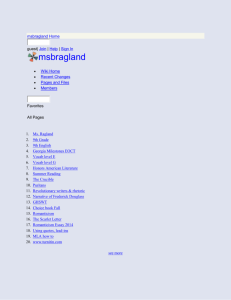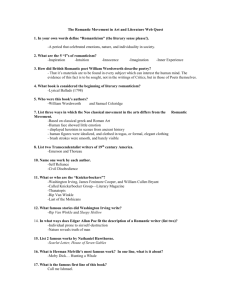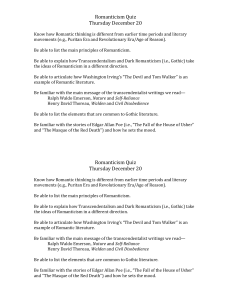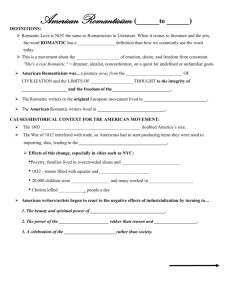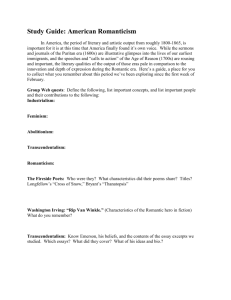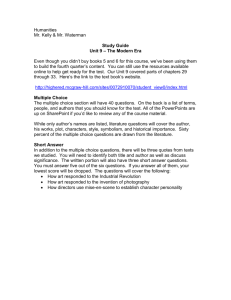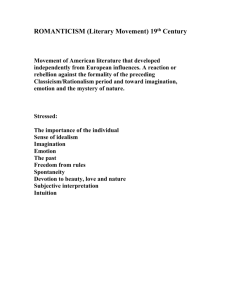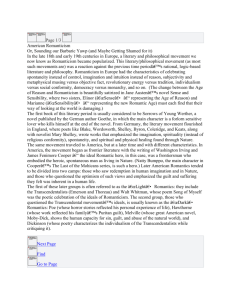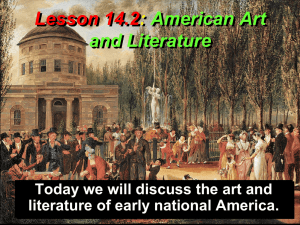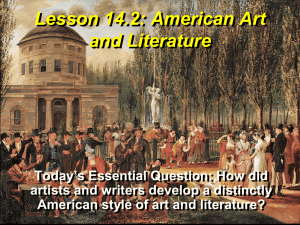the beginning of “american” literature
advertisement
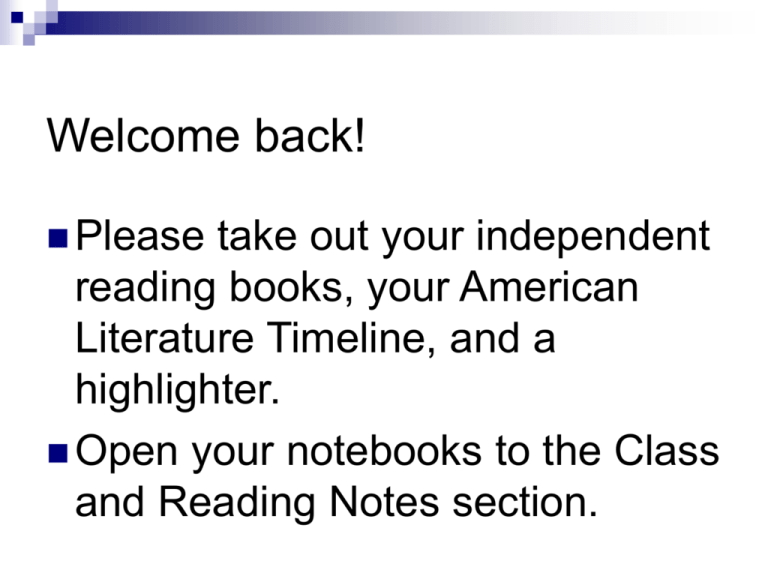
Welcome back! Please take out your independent reading books, your American Literature Timeline, and a highlighter. Open your notebooks to the Class and Reading Notes section. THE BEGINNINGS OF AMERICAN LITERATURE The “BIG IDEAS” When and in what ways did AMERICAN literature first begin to differentiate itself from European writing? The “BIG IDEAS” How did early American literature begin to define what “American” means? The “BIG IDEAS” Who were the first influential writers of American literature? What did they write? Why was their work important? How is it an example of romanticism? American Literature Timeline ROMANTICISM (1800-1855) Historical context Expansion of book publishing, magazines, newspapers Industrial Revolution Abolitionist movement Genre/Style short stories, novels, poetry imagination over reason; intuition over fact Focused on the fantastic of human experience. Writing that can be interpreted two ways: surface and in depth. Focus on inner feelings Gothic literature (sub-genre of Romanticism) Use of the supernatural. Characters have both evil and good characteristics. dark landscapes; depressed characters ROMANTICISM (1800-1855) Major writers (New York) Washington Irving First famous American writer; called "father of American Literature." Wrote short stories, travel books, satires. Legend of Sleepy Hollow terrified and amazed generations of children. Rip Van Winkle: success from failure; the antihero. "Devil and Tom Walker": an encounter-with-the-devil tale. Edgar Allen Poe Lousy childhood; substance abuse problems; reviled in his day. Created the modern short story and detective story. Poems: "The Raven", "Bells", "Annabel Lee", "Dream" Attacked two long-standing conventions: a poem has to be long; it must teach a lesson Short stories: "Fall of the House of Usher", "Pit and the Pendulum" Inspired future detective/horror stories (e.g., Sherlock Holmes, Norman Bates, Freddy Kruger). ROMANTICISM (1800-1855) Major writers (New England) Nathaniel Hawthorne (1804-1864) Wrote about sin and guilt; consequences of pride, selfishness, etc. The Scarlet Letter Short stories ("The Minister's Black Veil") Herman Melville (1819-1891) Ranked as one of America's top novelists, but recognized by few in his own time. Moby Dick Didn't sell: only his friend Nathaniel Hawthorne liked it; not reprinted for 60 years. Now considered America's greatest prose epic. ROMANTICISM (1800-1855) The Transcendentalists (1840-1855) Transcendentalism: stressed individualism, intuition, nature, self-reliance Major writers Ralph Waldo Emerson (1803-1882) His writings helped establish the philosophy of individualism, an idea deeply embedded in American culture. Nature and "Self-Reliance" important essays Henry David Thoreau (1817-1862) Resisted materialism; chose simplicity, individualism Walden –Thoreau’s most famous work Lived on Walden Pond for two years. A guidebook for life, showing how to live wisely in a world designed to make wise living impossible. "Civil Disobedience" - a primer for nonviolent protest ROMANTICISM (1800-1855) New Poetic Forms Henry Wadsworth Longfellow William Cullen Bryant Oliver Wendell Holmes James Russell Lowell “The First Snowfall” Walt Whitman Emily Dickinson Her poetry broke with convention: didn't look right; didn't rhyme; too bold; too radical. Concrete imagery, forceful language, unique style. Wrote 1775 poems, published only seven in her life. "Because I could not stop for Death--" “My life closed twice before its close—“ “The Soul selects her own Society—“ Paul Laurence Dunbar Rejected conventional themes, forms, subjects. Used long lines to capture the rhythm of natural speech, free verse, everyday vocabulary. "Song of Myself" "I Hear America Singing" "O Captain My Captain" “We Wear the Mask” Edwin A. Robinson “Richard Cory” “A Growing Nation” Vocabulary from this reading: (n) – sins; personal weaknesses literati (plural n) – persons of scholarly or literary accomplishment vice Please retrieve/take out your… JOURNALS Journal #6 How is AMERICA (the “New World”) different than Europe (the “Old World”)? What makes America unique when it comes to: Landscape Culture People Ideas Attitudes History Phrase your responses so as to say how it is in America as opposed to how it is in Europe. Washington Irving “The Father of American Literature” First American fiction writer to be recognized and respected in Europe a literary “ambassador” First great prose stylist of American romanticism Less formal Humorous—first to experiment with extravagant humor (a model which Twain perfected later) Wrote to be read for pleasure, yet people learned from his writing Wrote the first modern American short stories and the first great children’s literature. Wrote biographies and histories as entertainment Introduced the “familiar essay” to American readers Famous works: Knickerbocker’s History of New York The Sketch Book included two most famous short stories: The Legend of Sleepy Hollow and Rip van Winkle Satire Any form of literature that blends humor and wit with criticism for the purpose of ridiculing folly, vice, stupidity—the whole range of human foibles and frailties—in individuals and institutions. Satire Satire is a literary technique of writing or art which principally ridicules its subject (individuals, organizations, governments) often as an intended means of provoking change or preventing it. Satire Satire differs from mere comedy in that satire seeks to correct, improve or reform through ridicule, while comedy aims simply to amuse. Write examples on the board Phrase your responses so as to say what is different in America as opposed to how it is in Europe.
